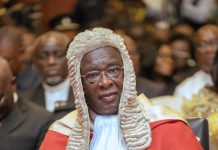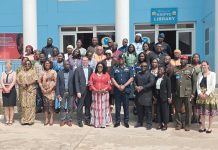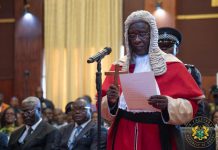
The Gulf of Guinea Northern Region Social Cohesion project is set to receive $150m, out of $450m from the World Bank, to help address challenges like security, climate change and others in the northern regions of Ghana.
Countries bordering the Sahel regions, which are also beneficiaries of the project, will share the remaining $300m. They are Benin, La Cote d’Ivoire and Togo.
Addressing participants during the unveiling of the project in Bolgatanga on Friday, Dr.Bawumia lavished praises on the minister responsible for Local Government, Decentralisation and Rural Development, Dan Kweku Botwe, for “designing the launching of this key project, in collaboration with relevant stakeholders”.
Dr Bawumia stated that the project had been designed to among other things mitigate the devastating effects of the spill-over of conflicts and extremism in the Sahel region, reduce vulnerability and exposure to climate change, strengthen local institutions, improve economic opportunities and build public trust.
He said the project focuses particular attention on citizens staying in border communities where the marginalised and vulnerable groups, such as women and children are exposed and prone to the threats of terrorism from the Sahel regions.
“The project has been conceived and designed to address the effects of spill-over of conflicts and extremism from the Sahel regions, reduce vulnerability and exposure to climate change, strengthen local institutions, improve economic opportunities and build public trust.
“It focuses mostly on border communities where the citizenry, especially women and children are exposed and susceptible to the threats of terrorism from the Sahel regions,” he noted.
Dr.Bawumia expressed optimism that the project would be implemented in a timely manner, in order to achieve its expected goals.
He profoundly expressed gratitude to the World Bank Group for granting the government of Ghana and the other Gulf of Guinea countries the loan to ensure the project becomes a reality. He was also thankful to partner agencies for their invaluable contribution towards the successful design of the programme.
On his part, Country Director of World Bank Group, Pierre Frank Laporte, also heaped praises on the Ministry of Local Government, Decentralisation and Rural Development, the Ministry of Finance, the Ministry of Youth and Sports, NDPC and all other stakeholders, for their untiring work towards the implementation readiness of Ghana’s part of the project.
He corroborated Dr.Bawumia’s assertion, stating that the programme is “aimed at proactively preventing the spread of conflict from the Sahel, reducing vulnerability to climate change and strengthen local institutions, economic opportunities and public trust in 48 districts in the North of Ghana.
According to him, the project is geared towards reducing poverty rates in the region, improving access to critical infrastructure (roads, market, electricity connection and public services).
He assured the Vice President of the World Bank Group’s commitment to collaborating with the government of Ghana through the new Country Partnership Framework to combat spatial and other inequalities, improve socio-economic, governance and promote inclusive growth and poverty reduction.
Chairman for the occasion, NabaPariyongKosom Saga Yelzoya II, Paramount Chief of the Nangodi traditional area was full of thanks to the World Bank Group and appealed to the Bretton Wood institution to try its possible best and disburse funds to the government of Ghana,so that thePwalugu Multipurpose Dam project could be successful.
The project aims at proactively and swiftly preventing the spread of conflict from the Sahel, reduce vulnerability to climate change and strengthen local institutions, economic opportunities, and public trust.
It is the anticipation of the implementing agencies that it will reach over 4,600 border-zone communities across the Northern Gulf of Guinea sub-region, with particular focus on vulnerable and marginalized clusters in border areas exposed to conflict and climate risks.
Forty-eight (48) Metropolitan, Municipal and District Assemblies in northern Ghana are expected to benefit from the project. Eight districts are from the Northern Region, all fifteen district Assemblies from the Upper East Region, eleven from the Upper West Region, six from the North East Region, four from the Savannah Region and four from the Oti Region.
In attendance were regional ministers from the Savannah, Northern, North East, Oti, Upper East and Upper West regions, the beneficiary regions of the project.
It brought together traditional rulers, Local Government Ministry, Metropolitan, Municipal and District Chief Executives (MMDCEs) of all the forty-eight (48) Metropolitans, Municipalities and Districts in the six regions of Northern Ghana.
From Beyeni Elijah Yenibey, Bolgatanga









